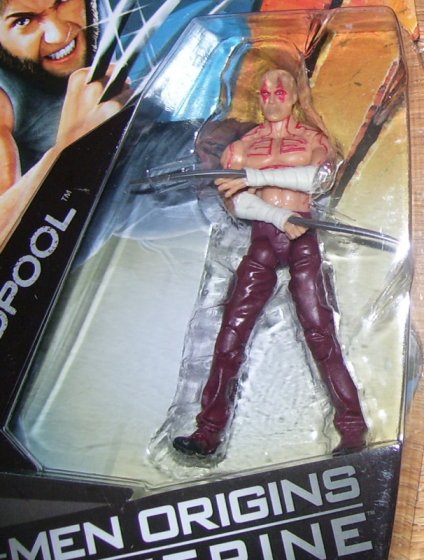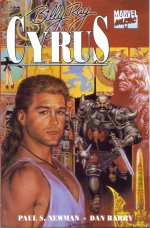
Black History Month ’09 #21: Ether
February 21st, 2009 Posted by david brothers | Tags: bill willingham, black history month 2009, Colored Commentary, DC comicsI’m trying to figure out how to approach this one. I almost didn’t want to talk about it because it seems like such a “No duh” situation to me, but I have clearly missed something.
Noted comics writer Bill Willingham recently wrote an essay in which he responded to Attorney General Eric Holder’s position that we’re a nation of cowards in terms of discussion and treatment of race. Holder’s speech (transcript here) says, boiled down, “use black history month to genuinely discuss race and learn from each other, instead of self-segregating.”
From Willingham’s own mouth:
According to the new Attorney General, Eric Holder, speaking today at the Justice Department, we’re a nation of cowards because we don’t talk about race enough. I have several responses to that grotesque statement, most of which aren’t printable. But I will say this much: If the past discussions about race in which I’d participated (voluntarily and otherwise) didn’t always – not often, not most of the time, but always – devolve into name calling, where I was denounced as a racist (usually as a starting point for said conversation), then I might today be more willing to continue to have discussions on the subject. I suspect I’m not alone in this.
In my experience, anyone who doesn’t immediately and enthusiastically subscribe to the idea that all American whites are active oppressors against other races is an irredeemable racist. Of course if you do agree you’re still a racist, just one of the self confessed variety.
In the interests of full and fair disclosure, I’m apparently also a misogynist, a homophobe, and a Nazi, this according to folks (some of whom were friends and colleagues) upon finding out that I have problems with feminism, gay marriage, and gun control. There were other accusations I could list, given time, but the truth is such incidents are too common and never important enough to be worth devoting too much of my time and memory.
Willingham is running into a lot of things here, among them extremism, either/or politics, and (wait for it) cowardice. He also makes a lot of statements (“Name-calling is the proprietary weapon of the left. There’s no equality of blame, no comparison. We on the right aren’t “just as bad.”“) that are just completely stupid to anyone with half a brain and indefensible to those with a full one. I’m going to stick to the first three, however.
Extremists exist on both “sides” of the political spectrum. The people who scream about how Bush is Hitler is no different from the people who suggest that single mothers are the downfall of society. I find DailyKos just as aggravating as Ann Coulter. These are the people who are going to shout at you for thinking differently and they exist on both sides of the aisle. News flash: jerks are jerks, and will be jerks according to their opinions.
Just to give Willingham the benefit of the doubt, I’m going to assume that he’s talking about outrage-based discussion. When something bad or offensive happens, people blog/talk/write about it and either discuss their outrage that it happened or suggest ways to fix it or ensure that it never happens again. I can see how that would be daunting to join that discussion, as it involves a lot of raised emotions, anger, and pure helplessness.
If every discussion you’ve ever had about race has ended in name-calling, you’re either a racist or arguing with fools. You aren’t going to get in touch with extremists of any stripe. The people who matter, and the people who actually think about things, are the people in-between. I’ve had some fascinating conversations with people who were racist in thought and deed, and I’d like to think that we both came away better for it. When Holder said that we need to do better in discussing race, this is what he was talking about. A frank exchange of ideas.
Building on that point, I think it’s important to say that I disagree with either/or politics in general. I think that reducing someone’s political views to Repub/Dem or Liberal/Conservative is a loser’s game at best, as no one is actually that simple. I’m conservative or liberal on some things, but not others. My grandparents run conservative, but they voted Obama. Politics isn’t as easy as black and white, and approaching it on that level, and only that level, just means that you lost before you even started. It isn’t just liberals who want to discuss race. There are plenty of conservatives who care about equality and becoming truly integrated. Caring about race, or even just talking about it occasionally, doesn’t make you liberal.
The main thrust of Willingham’s post, however, is that since people were mean to him when discussing race (or other “liberal” issues), he is going to take his ball and go home. He isn’t going to discuss it with liberals because they have no interest in reasoned discourse and are only interested in name-calling. He’s only going to discuss it with those who are interested in actually speaking. While I can understand the spirit of the sentiment (you can’t get through to some people), the way he’s applied it is extraordinarily myopic. Anyone can tell that both sides descend to name-calling on a near-daily basis, but for some reason, only liberals count? But, okay, let’s treat it as if it were a reasonable choice.
The problem with making that choice is that it makes you a coward. Someone hurt your feelings by calling you a name, so you are going to tighten up and kick the dirt and flip over the chess table and kick the ball over the fence and go home, because screw them. Making that choice, and making a point to explain your position in opposition to Holder’s speech, makes you a coward.
Holder’s position is that people are still too tight-lipped about race. Not even racism: just race. This isn’t an indictment of conservatives or liberals. It’s an indictment of both. There is too much shouting and not enough listening going on. When your idea of a reasonable response is to go “I’m not listening, because screw them,” you lost. That’s a child’s reaction.
At the same time, if you’re that scared to talk about race, maybe you should pump your brakes and just sit in the corner while grown folks talk at the grown up’s table. Race isn’t something you can boil down to right and wrong, so it is something that is difficult to talk about. It’s easy to screw up on either side of the argument, and race is sensitive enough that screw-ups can be intensely frustrating.
Okay. That’s fine. That’s why Holder says, “[A]n unstudied, not discussed and ultimately misunderstood diversity can become a divisive force.” You should discuss race because it is something that impacts all of our lives, and until we push through it, we can neither get past it nor understand it. Holder wants the races to talk to each other and share. I think that’s an admirable goal, and it’s one I’ve discussed over and over this month. Conversation is key. We’re not that different from each other, but we are different.
Bill Willingham lost. He fell right into Holder’s trap. Holder says that people don’t honestly talk about race enough, and put up so many barriers that race has remained a touchy subject for far too long. Willingham’s response? “Nuh-uh, don’t even talk to me.”
I’ve had people tell me that they don’t talk about race because they know that they’ll just screw it up or because they don’t have anything to bring to the table. And you know what? That’s a fair and intelligent response. Being able to recognize your own shortcomings is just taking responsibility. Some people don’t know how to dig in and get their hands dirty, and recognizing that fact is something to be respected.
But, being that guy that’s like “I’m not a racist, but people keep calling me one, so screw liberals and forget any idea of talking about racism?” That makes you a coward.



